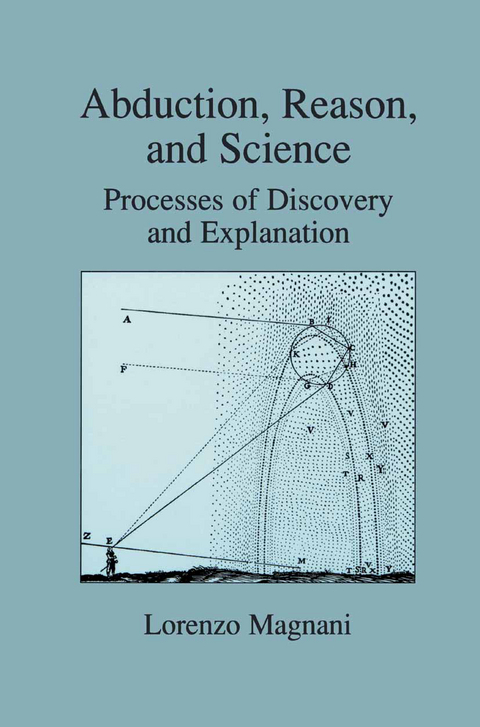
Abduction, Reason and Science
Processes of Discovery and Explanation
Seiten
2012
|
Softcover reprint of the original 1st ed. 2001
Springer-Verlag New York Inc.
978-1-4613-4637-1 (ISBN)
Springer-Verlag New York Inc.
978-1-4613-4637-1 (ISBN)
This volume explores abduction (inference to explanatory hypotheses), an important but neglected topic in scientific reasoning. The main thesis is that abduction is a significant kind of scientific reasoning, helpful in delineating the first principles of a new theory of science.
This volume explores abduction (inference to explanatory hypotheses), an important but neglected topic in scientific reasoning. My aim is to inte grate philosophical, cognitive, and computational issues, while also discuss ing some cases of reasoning in science and medicine. The main thesis is that abduction is a significant kind of scientific reasoning, helpful in delineating the first principles of a new theory of science. The status of abduction is very controversial. When dealing with abduc tive reasoning misinterpretations and equivocations are common. What are the differences between abduction and induction? What are the differences between abduction and the well-known hypothetico-deductive method? What did Peirce mean when he considered abduction a kind of inference? Does abduction involve only the generation of hypotheses or their evaluation too? Are the criteria for the best explanation in abductive reasoning epis temic, or pragmatic, or both? How many kinds of abduction are there? The book aims to increase knowledge about creative and expert infer ences. The study of these high-level methods of abductive reasoning is situ ated at the crossroads of philosophy, epistemology, artificial intel1igence, cognitive psychology, and logic; that is, at the heart of cognitive science. Philosophers of science in the twentieth century have traditionally distin guished between the inferential processes active in the logic of discovery and the ones active in logic of justification.
This volume explores abduction (inference to explanatory hypotheses), an important but neglected topic in scientific reasoning. My aim is to inte grate philosophical, cognitive, and computational issues, while also discuss ing some cases of reasoning in science and medicine. The main thesis is that abduction is a significant kind of scientific reasoning, helpful in delineating the first principles of a new theory of science. The status of abduction is very controversial. When dealing with abduc tive reasoning misinterpretations and equivocations are common. What are the differences between abduction and induction? What are the differences between abduction and the well-known hypothetico-deductive method? What did Peirce mean when he considered abduction a kind of inference? Does abduction involve only the generation of hypotheses or their evaluation too? Are the criteria for the best explanation in abductive reasoning epis temic, or pragmatic, or both? How many kinds of abduction are there? The book aims to increase knowledge about creative and expert infer ences. The study of these high-level methods of abductive reasoning is situ ated at the crossroads of philosophy, epistemology, artificial intel1igence, cognitive psychology, and logic; that is, at the heart of cognitive science. Philosophers of science in the twentieth century have traditionally distin guished between the inferential processes active in the logic of discovery and the ones active in logic of justification.
1 Hypothesis Generation.- 2 Theoretical Abduction.- 3 Manipulative Abduction.- 4 Diagnostic Reasoning.- 5 Visual and Temporal Abduction.- 6 Governing Inconsistencies.- 7 Hypothesis Withdrawal in Science.- References.- Author Index.
| Zusatzinfo | XVII, 205 p. |
|---|---|
| Verlagsort | New York, NY |
| Sprache | englisch |
| Maße | 155 x 235 mm |
| Themenwelt | Geisteswissenschaften ► Geschichte |
| Geisteswissenschaften ► Philosophie ► Allgemeines / Lexika | |
| Geisteswissenschaften ► Philosophie ► Logik | |
| Geisteswissenschaften ► Psychologie ► Allgemeine Psychologie | |
| Geisteswissenschaften ► Psychologie ► Verhaltenstherapie | |
| Naturwissenschaften | |
| Sozialwissenschaften | |
| ISBN-10 | 1-4613-4637-1 / 1461346371 |
| ISBN-13 | 978-1-4613-4637-1 / 9781461346371 |
| Zustand | Neuware |
| Haben Sie eine Frage zum Produkt? |
Mehr entdecken
aus dem Bereich
aus dem Bereich
die letzten Jahre der Philosophie und der Beginn einer neuen …
Buch | Hardcover (2024)
Klett-Cotta (Verlag)
CHF 39,20
Gesundheitsschutz, Selbstbestimmungsrechte, Rechtspolitik
Buch | Softcover (2024)
Kohlhammer (Verlag)
CHF 54,60
Jenseits von Identität | Ausgezeichnet mit dem Leipziger Buchpreis …
Buch | Softcover (2023)
Ullstein Taschenbuch Verlag
CHF 19,55


